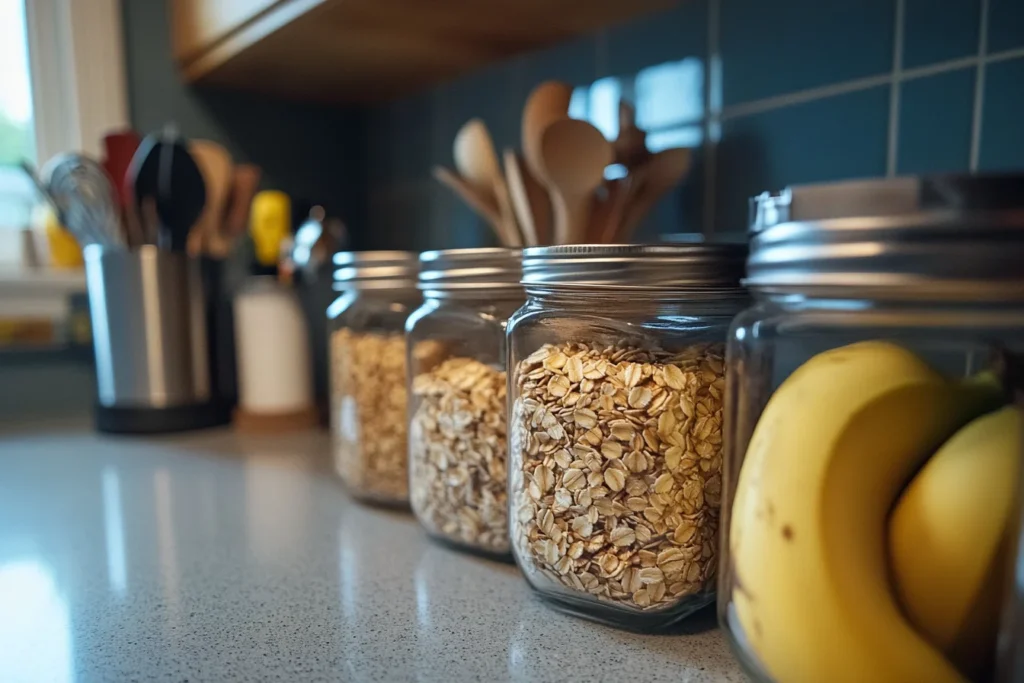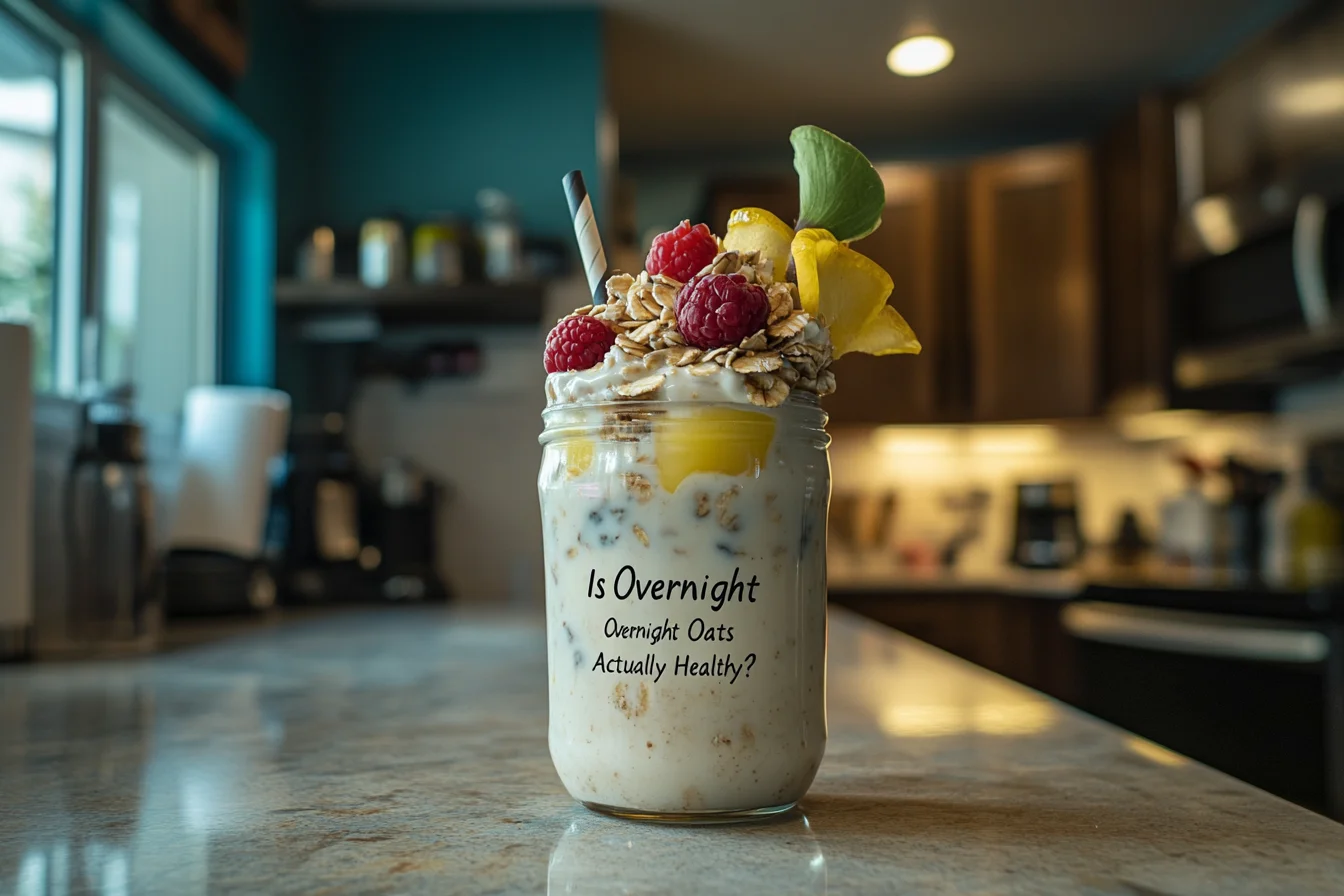Introduction
With the rise of health-conscious eating, overnight oats have quickly become a favorite among breakfast enthusiasts. But the question remains: Is overnight oats actually healthy? While many sing praises about its convenience and nutrition, there’s more to it than meets the eye. From gut health benefits to potential drawbacks, this article dives deep into whether overnight oats are truly a healthy choice. So, let’s sift through the oats and uncover the truth behind the overnight oats phenomenon. Whether you’re wondering if overnight oatmeal can improve your digestion, or if it’s the right healthy breakfast option for weight loss, we’ve got you covered.
What Are Overnight Oats and How Do They Work?
Overnight oats are a simple yet nutritious breakfast choice, made by soaking oats overnight in liquid usually water, milk, or a dairy-free alternative. The soaking process softens the oats, allowing them to absorb the liquid, which gives them a creamy texture similar to traditionally cooked oatmeal. Often, they are mixed with fruit, nuts, seeds, or sweeteners to enhance flavor.
This no-cook method has grown in popularity due to its convenience just prep the night before, and it’s ready to go in the morning. But is this quick breakfast as good for you as it seems?
A Brief History of Overnight Oats
Believe it or not, the idea of soaking oats overnight is nothing new. This method has been used for centuries, often by people who didn’t have time to cook in the morning. But in recent years, the trend has exploded with the rise of meal prep culture and the desire for quick, nutritious breakfasts. As more people look for easy, on-the-go options, overnight oats have found their place in many households.
Why Are Overnight Oats So Popular?
Overnight oats have become a go-to breakfast for busy individuals and health-conscious eaters alike. Why? For one, they’re incredibly convenient to prep them in a mason jar the night before, and they’re ready to eat in the morning. Plus, they’re highly customizable, allowing you to add a variety of toppings, from fresh fruit to nuts, and even superfoods like chia seeds and flax.
But beyond the convenience and versatility, overnight oats are also seen as a healthy choice. Packed with fiber, antioxidants, and essential nutrients, many believe that overnight oats provide a balanced start to the day. But are these claims supported by science, or are they simply part of the marketing hype?
The Benefits and Risks of Overnight Oats
Before diving into the details, it’s important to address both the benefits and potential risks of incorporating overnight oats into your diet. For many, they’re an easy and nutritious meal option, but there are a few caveats to consider, especially if you’re eating them regularly.
The health benefits of overnight oats are abundant, but some people may experience digestive discomfort or other issues depending on their individual health needs. We’ll look more into the pros and cons of overnight oats in the next sections. But for now, let’s move on to the key nutritional benefits that have people calling them a “superfood.”
Stay tuned, because the rest of the article will explore the nutritional value, health benefits, and any possible drawbacks of making overnight oats a staple in your morning routine.
Nutritional Value of Overnight Oats: Are They Healthy?
Now that we’ve touched on the basics, let’s dive into the real question: are overnight oats healthy? When we talk about the nutritional value of overnight oats, we’re asking what kind of benefits they provide. Are they packed with nutrients, or just a trendy snack that doesn’t live up to its promises?
At first glance, overnight oats seem like a nutritious option. After all, oats themselves are full of fiber, vitamins, and minerals, making them an excellent foundation for a healthy meal. But when combined with other ingredients—like milk, yogurt, fruit, nuts, and seeds—overnight oats can be tailored to meet a variety of dietary needs and health goals.
What Ingredients Are Commonly Used in Overnight Oats?
A typical overnight oats recipe starts with rolled oats and some form of liquid, such as milk, almond milk, or coconut water. The oats absorb the liquid, creating a creamy texture by morning. You can also add a variety of ingredients like chia seeds, flaxseeds, Greek yogurt, honey, fruits, and nuts. These ingredients boost the nutritional value of the oats, turning them into a nutrient-dense breakfast.
Let’s break down some of these ingredients:
- Oats: Naturally rich in soluble fiber, oats are known for promoting heart health and digestive wellness. They also contain essential vitamins and minerals, including manganese, iron, and B vitamins.
- Milk or Dairy Alternatives: Whether you opt for dairy or plant-based alternatives like almond, oat, or soy milk, this liquid base provides additional protein, calcium, and sometimes, vitamin D.
- Fruit: Adding fresh fruits like berries, bananas, or apples not only gives your overnight oats a natural sweetness but also provides vitamins like vitamin C, as well as antioxidants that can fight free radicals in the body.
- Seeds and Nuts: Chia seeds, flaxseeds, and almonds are commonly added to this recipe. These additions provide healthy fats, fiber, and proteins, all of which contribute to keeping you full longer.
Are Overnight Oats a Good Source of Protein?
One of the standout nutritional qualities of overnight oats is the possibility of making them a good source of protein. While oats themselves don’t have much protein (around 6 grams per 1/2 cup), when you add Greek yogurt or plant-based protein powder to the mix, the protein content can increase significantly.
Overnight oats with protein-rich ingredients can help support muscle repair, promote satiety, and even aid in weight management. For those on plant-based diets, adding a scoop of protein powder or incorporating protein-rich seeds can fill this gap.
How Fiber in Overnight Oats Contributes to Health
Another benefit of overnight oats is their high fiber content. Oats are an excellent source of soluble fiber, specifically beta-glucan, which has been shown to lower cholesterol levels and improve heart health. Fiber is also essential for digestive health, promoting regular bowel movements and feeding beneficial gut bacteria.
The high fiber content of overnight oats can also help you stay full longer, making them an excellent breakfast option for weight management. When combined with other fiber-rich ingredients like chia seeds, flaxseeds, or fruit, your overnight oats turn into a powerhouse of digestive health.
Are Overnight Oats High in Sugar?
It’s easy to think that overnight oats might be too high in sugar, especially if you’re adding sweeteners like honey or maple syrup. However, the sugar content in overnight oats largely depends on the ingredients you choose.
If you use whole ingredients like fresh fruit or opt for a minimal amount of honey, the sugar content stays relatively low. Overnight oats can be a great low-sugar option compared to other breakfast choices like sugary cereals or pastries. However, if you’re using pre-packaged oat mixes, they may contain added sugars and preservatives, so it’s always best to check the label and make your overnight oats from scratch.
By controlling the sweeteners and opting for unsweetened yogurt or plant-based milk, you can easily keep the sugar content in check and make overnight oats a healthy breakfast option.
Micronutrients in Overnight Oats: More Than Just Fiber
While oats are best known for their fiber content, they also provide a range of micronutrients. Oats are particularly high in manganese, which is vital for bone health and metabolism. They also provide iron, an essential nutrient that helps with oxygen transport in the blood.
Adding fruits like berries not only boosts the flavor but also brings in additional vitamins, particularly vitamin C, which supports immune function. Nuts like almonds provide magnesium, a mineral that plays a role in muscle and nerve function, while chia seeds offer calcium for bone health.
Overnight oats can be incredibly nutrient-dense when prepared correctly. They offer a balanced mix of macronutrients fiber, protein, and healthy fats as well as key micronutrients that support various aspects of health, from digestion to bone strength. However, as with any meal, it’s important to keep an eye on portion sizes and ingredient choices to ensure you’re getting the maximum benefit.

Health Benefits of Overnight Oats: Is This Breakfast Really Healthy?
Now that we’ve taken a closer look at the nutritional value of overnight oats, let’s explore the actual health benefits they offer. Many people swear by this convenient breakfast, citing its positive impact on digestion, weight management, heart health, and more. But does science support these claims? Are overnight oats as healthy as they’re often portrayed?
In this section, we’ll dive into some of the health benefits associated with eating overnight oats regularly and whether it’s a good choice for your overall well-being.
Overnight Oats and Weight Loss: Can They Help You Shed Pounds?
If you’re looking to manage your weight, overnight oats might just be your new best friend. High in fiber, particularly soluble fiber like beta-glucan, they help keep you feeling full for longer. This means you’re less likely to reach for unhealthy snacks throughout the morning.
Additionally, the fiber in overnight oats plays a key role in regulating blood sugar levels, preventing spikes and crashes that can lead to cravings. With their slow digestion and steady energy release, overnight oats can support healthy weight management without leaving you hungry. Combine them with protein-rich toppings like Greek yogurt or chia seeds, and you’ve got a balanced meal that keeps you satisfied.
Pro tip: For an even better weight-loss boost, keep the sugar content low by using natural sweeteners like stevia or monk fruit, rather than refined sugars.
Improving Digestion with Overnight Oats: A Gut-Friendly Breakfast
If you’ve ever struggled with digestion issues, adding overnight oats to your routine might help. The fiber in oats not only aids in keeping things moving in your digestive system but also promotes gut health. Specifically, the soluble fiber in oats helps to feed the good bacteria in your gut, supporting a healthy microbiome.
Because the oats have already absorbed liquid overnight, they’re softer and easier on the stomach compared to traditional oatmeal. This can be especially beneficial for those with sensitive stomachs or individuals dealing with bloating or constipation. Regular consumption of overnight oats can keep your digestion running smoothly and reduce discomfort.
Overnight Oats and Heart Health: A Healthy Heart Starts in the Morning
One of the most widely touted benefits of overnight oats is their ability to promote heart health. Oats, particularly their soluble fiber content, have been shown to help lower cholesterol levels. Soluble fiber binds with bile acids in the digestive system, helping to remove cholesterol from the body. Over time, this can contribute to better cardiovascular health and a reduced risk of heart disease.
Research suggests that eating oats regularly can lower LDL (“bad” cholesterol) levels, while also boosting HDL (“good” cholesterol) levels. So, if you’re looking for a simple, affordable way to keep your heart healthy, overnight oats might be just what you need.
Blood Sugar Control and Overnight Oats: Stabilizing Your Glucose Levels
For those concerned about blood sugar levels, overnight oats are a great option. Oats have a low glycemic index, meaning they don’t cause rapid spikes in blood sugar like other refined grains or sugary breakfast options might. The fiber and protein content in overnight oats further slow down the release of sugar into the bloodstream, providing a steady source of energy.
This steady blood sugar regulation is particularly beneficial for individuals with diabetes or those looking to prevent insulin resistance. The combination of overnight oats and healthy fats, like those found in almonds or chia seeds, helps to keep blood sugar levels in check while still providing a nutritious, energizing start to your day.
Overnight Oats as a Good Source of Antioxidants: Fight Free Radicals with Your Breakfast
Did you know that overnight oats can also be a good source of antioxidants? The oats themselves contain compounds like avenanthramides, which are polyphenolic antioxidants. These antioxidants help to combat oxidative stress in the body, potentially lowering your risk of chronic diseases like heart disease and cancer.
By adding antioxidant-rich fruits like berries, you can boost the antioxidant power of overnight oats even more. Blueberries, raspberries, and strawberries are rich in vitamins C and E, both of which help protect the body from the damaging effects of free radicals. This makes overnight oats not only a filling and healthy breakfast but also a powerful defense against aging and disease.
Overnight Oats and Bone Health: Strengthen Your Bones with a Nutritious Start
Another lesser-known benefit of overnight oats is their contribution to bone health. While oats themselves are not particularly high in calcium, the addition of dairy or fortified plant-based milk can help provide the calcium your body needs for strong bones. Many plant-based milks (like almond or soy milk) are fortified with calcium, so they provide a significant amount of this important mineral.
Additionally, oats contain magnesium and phosphorus, both of which play a role in maintaining bone strength. Together with calcium, these nutrients form a robust foundation for bone health, helping to reduce the risk of osteoporosis and fractures later in life.
Is It Safe to Eat Overnight Oats Every Day?
For many, overnight oats are a staple in their breakfast routine, but is it safe to eat them every day? Generally, yes! When prepared with whole, natural ingredients, overnight oats can be a nutritious, balanced meal to enjoy regularly.
However, it’s important to keep an eye on portion sizes and the types of ingredients you add to your oats. Overloading your overnight oats with sugar, processed toppings, or high-calorie add-ins could offset the health benefits. Moderation is key, but if you’re using whole grains, fresh fruit, and healthy fats, you can enjoy this healthy breakfast every day without issue.
The beauty of this breakfast is that it’s not only convenient and customizable, but it also provides a powerful punch of nutrients, antioxidants, and fiber—all of which contribute to a healthier, more energized you.
FAQs about Overnight Oats
Are Overnight Oats Healthy for Weight Loss?
Yes! Overnight oats are high in fiber, which helps you feel fuller longer, reducing the likelihood of snacking. Combined with protein and healthy fats, they provide steady energy and can support weight management.
Is It OK to Eat Overnight Oats Every Day?
Absolutely! Eating overnight oats every day is fine as long as you use wholesome ingredients. Just watch for added sugars or calorie-dense toppings to keep the meal balanced and healthy.
Is It Healthier to Soak Oats Overnight?
Yes, soaking oats overnight helps reduce phytic acid, making the nutrients more absorbable. It also makes oats easier to digest, which can be beneficial for sensitive stomachs.
What Not to Add in Overnight Oats?
Avoid adding excessive sugar, processed ingredients like flavored yogurts, and too many high-calorie toppings such as nuts and seeds, which can make the meal less healthy. Stick to whole, natural ingredients for the best results.

